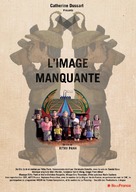Reviews provided by RottenTomatoes
Owen Gleiberman, Entertainment Weekly: The film captures how Pol Pot took Mao's Great Leap Forward to new levels of Marxist madness. Read more
Farran Smith Nehme, New York Post: Panh uses the props and eerie clips from Khmer Rouge propaganda newsreels to tell about his family, and his country. Along with starkly poetic narration, read by Randal Douc, the effect is devastating, without a single scene of actual bloodshed. Read more
Joe Morgenstern, Wall Street Journal: These miniatures magnify their subjects, and ennoble them. The picture is anguishing to see, but it isn't missing anymore. Read more
John Hartl, Seattle Times: A uniquely subjective account of the Cambodian genocide of the 1970s, "The Missing Picture" is the work of Rithy Panh, a Cambodian native who left his homeland when he was an adolescent. Read more
Justin Chang, Variety: The film is a brave act of witness complicated by the documaker's decision to re-create his experiences using clay figurines, a tricky aesthetic device that raises fascinating and problematic questions of representation. Read more
A.A. Dowd, AV Club: With sober eloquence, the filmmaker lays out the arrival of the Khmer Rouge, the philosophy used to justify their crimes, and the slow slipping away of his family, each member claimed by this horrible social experiment. Read more
Peter Keough, Boston Globe: [It] aspires to a poetry about barbarism that will not let us forget. Read more
J. R. Jones, Chicago Reader: I could say the movie requires some patience, but in fact it commands patience with its humbling tale of a boy being cruelly torn from one life and forced into another one of extreme privation. Read more
Michael Phillips, Chicago Tribune: This is a first-person account of astonishing suffering, yet the experience of watching "The Missing Picture" is not punishing. Read more
Neil Young, Hollywood Reporter: A sobering, ultimately numbing peek into the living hell of 1970s Cambodia. Read more
Kenneth Turan, Los Angeles Times: "The Missing Picture" is personal and unexpected, a documentary that mixes media in an unusual way to very potent effect. Read more
Michael Nordine, L.A. Weekly: The abstract approach both disallows the possibility of overstatement and implicitly underscores the full emotional weight of these horrific events. Read more
Richard Brody, New Yorker: Panh honors the Khmer Rouge's victims while staging the agony and responsibility of memory itself. Read more
Jordan Hoffman, New York Daily News: Panh believes that those who survive such oppression are obligated to speak about it - and this chronicle is impossible not to watch. Read more
Manohla Dargis, New York Times: The audacity of "The Missing Picture" - a brilliant documentary about a child who held on to life in Cambodia's killing fields - is equaled only by its soulfulness. Read more
Michael Sragow, Orange County Register: Panh fulfills his debts to the dead not just by adding to the visual record of genocide, but also by creating a transcendent work of art. Read more
Steven Rea, Philadelphia Inquirer: Many films have examined from many vantages the Khmer Rouge's nightmare reign, notably Roland Joffe's 1985 Oscar winner The Killing Fields. Read more
Christy Lemire, RogerEbert.com: As an examination of memory and experience and how they shape us, "The Missing Picture" is meaningful beyond its specific subject matter. Read more
Andrew O'Hehir, Salon.com: Panh blends documentary, personal memoir and eccentric artistic experiment ... Read more
Colin Covert, Minneapolis Star Tribune: In narration that is poetic and historically astute, Panh layers his own memoir atop his nation's. Read more
Trevor Johnston, Time Out: This isn't just another arthouse film, but a powerful testament to incredible human resilience Read more
Joshua Rothkopf, Time Out: The conceit is tremendously daring, but one with a huge payoff, suggesting an evil that can't be fully processed by young eyes. Read more
Stephanie Zacharek, Village Voice: The Missing Picture is so immediate, so vital, it practically breathes. Not all memoirs need to exist. But the gentle urgency of Panh's story is right there in the filmmaking. Read more
Michael O'Sullivan, Washington Post: As haunting as it is haunted, "The Missing Picture" leaves viewers' heads rattling with ghosts. Read more

